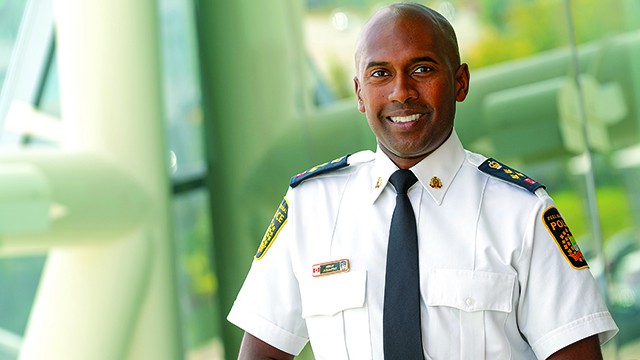Cops in Mississauga and Brampton must confront systemic racism, says Peel’s police chief
Published May 28, 2021 at 9:26 pm

Peel Regional Police (PRP) Chief Nishan Duraiappah believes he has 3,200 of the best officers patrolling Mississauga and Brampton, but he admits they can do better when it comes to handling systemic racism in the organization.
Which is why Peel’s unprecedented partnership with the Ontario Human Rights Commission (OHRC) to develop and implement the changes needed to eliminate systemic racism in law enforcement is much needed.
“There’s this great acknowledgment that systems have the opportunity to always get better,” Duraiappah said during Friday morning’s Peel Police Services Board meeting where they received and passed a motion on the overview of the Human Rights Project undertaken by the PRP and PPSB with support from the OHRC.
“As police leaders and organizations, we need to go beyond verbal affirmations and understanding the willingness to step out and implement changes without fear of failure is required and expected.”
Duraiappah believes he was brought here to do exactly that by the PPSB and he re-affirmed the PRP’s commitment to the project.
“As we evolve from a traditional law enforcement model to a pro public health emphasis that’s rooted in a human rights focus and adapting and implementing the following principals under a systemic change framework, I want to acknowledge the systems level changes that are required across my sector in policing as well as other human services is much needed,” he said.
The time for organizational change is now, says Ontario Human Rights Commission Chief Commissioner Ena Chadha. Addressing systematic racism requires hard work and it appears they have found a willing partner.
“Peel Police have signaled that they are willing to do that meaningful work to face that reality of systemic discrimination through our memorandum of understanding,” Chadha said. “Up until now, few, if any, police services in Canada have done this.
“Peel Police have expressed a willingness to tackle structural barriers, implement accountability in monitoring mechanisms, examine the role of policing, addressing community calls for de-escalation and defunding, and most importantly they’ve agreed to adapt legally binding remedies to end systemic racism in policing.”
The agreement will see them collectively, along with the community, create a road map on how to go forward with concrete actions to remedy long-standing racial disparity.
She said Peel Police have already taken critical steps from engaging respected experts in race based data collection, anti-racism and de-escalation training, to working with the newly-formed anti-racism Human Rights committee.
“Most importantly, these binding commitments will not be finalized unless we reflect the experiences and the issues of communities affected by policing in Peel, particularly black, racialized and indigenous people,” Chadha said. “This past year has shone light on black, indigenous and racialized communities have born the injustice and the tragedy of systemic racism.
“That’s why the critical next step is to put in a robust engagement plan that builds on long term, on-going connections with communications channels for affected communities to make sure police services respect human rights, safety and dignity of every one in Peel.”
There will be planned community engagement sessions and a survey for this summer. Draft recommendations will be finalized this fall along with further community engagements on the recommendations.
The multi-year plan, which will include an independent governing board, will be established this fall with final recommendations put into a legally binding agreement before seeking PPSB and OHRC approval.
“Set time lines may shift a bit because this is new for us, so we really don’t know what’s coming,” said Peel Police Inspector Joy Edwards, who reports to Deputy Chief Anthony Odoardi who is the executive sponsor on the project.
“This will be a community-led initiative where we listen to what the community will have to say and then move forward,” Edwards added.
Brampton Councillor and PPSB member Mark Medeiros knows there’s a tremendous amount of work ahead for all involved.
“We look forward to that,” he said. “We know that there will be hurdles, there’ll be tough times, but we will one day look back and know that change was needed.
“And as a service, and as a community, we will be in a better position.”
There will be significant hurdles to overcome.
“We must recognize that historical distrust of police by radicalized communities is rooted in real harm and trauma,” Chadha said. “This is the crucial backdrop to our work.”
Building trust is key, something Mississauga Mayor Bonnie Crombie said was brought up when she met with members of her Black Caucus on Thursday.
“There is a reticence and concern and what was very evident (Thursday) as well were the issues of trust and accountability that have to be restored,” Crombie said.
Duraiappa knows this is a significant project, one where you can’t just check the boxes. One that will require some really heavy lifting and heavy discussions.
“I also understand under the concept of change and management that there will always be strong support, but there will be also always be criticism,” the Peel Police Chief said. “I just want to point out that the criticism we get from embarking on meaningful change, versus the change of being stagnant, is one I as a chief will not just dwell on.
“We are doing it on a foundation of good people here. We also recognize there’s an opportunity to do better and to make some system changes that have affected people in a disproportionate way.”
insauga's Editorial Standards and Policies advertising





